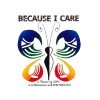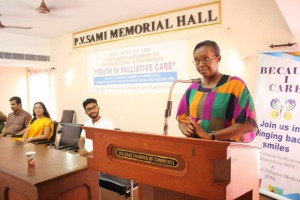
This week in Kerala, southern India, the first ever student and young people’s palliative care conference is taking place. It is called STUDENTSPALCON 2015. The impetus has come from the ever-resourceful Institute of Palliative Medicine in Kozhikode, and the associated Neighbourhood Networks in Palliative Care.
The conference website states:
“Critical engagement with the idea of youth involvement in palliative care is timely given its scope and the expanding palliative care needs of the society. The conference will see the participation of student volunteers and eminent figures in palliative care from around the world to educate, help replicate and improve the models of youth involvement in palliative care. The conference will feature oral presentations, interactive sessions and discussions by experts on the theme and will also have related competitions and contests”.
I was delighted to learn of this development and to be asked to send a message to the conference, which is reproduced in part below. All of us at the Glasgow End of Life Studies Group wish the students and the conference well and we look forward to learning more about the discussions and outcomes. And of course the pages of this blog are open to those involved who may wish to contribute their thoughts.
Annoucing the conference at student meeting
Message to the conference
In November 2004 I attended the first workshop on community participation in palliative care, held in Manjeri in northern Kerala. It was a transformative experience. The conference ranged over conceptual issues about the nature of community, the role of public health and primary care approaches in supporting communities, and the specific experience of the Neighbourhood Networks in Palliative Care that were then gathering momentum.
An abiding memory of the workshop was the presence everywhere of students and young people. The opening session was introduced by a local undergraduate. There were various poster presentations and information to be seen about ‘Palliative Care on Campus’. In the breaks there were lively conversations with young people about their interest in care for older and disadvantaged people. Indeed, throughout the meeting there was a sense of engagement with community participation, palliative care, questions of social action and support – and how younger people, and especially students, could become involved in these issues.
This was in stark contrast at that time to my experience of palliative care in the west. In western culture, hospice and palliative care had often been successful in capturing public interest, but support and volunteering had tended to come from the older age groups. It seemed a difficult challenge to look for ways to bring younger people into the palliative care community – aren’t they more focussed on the beginning rather the end of life, surely they are looking for more engaging ways to channel their energies and activities, why – with a whole life before you – would you want to think about mortality and death?
Recently I have seen how such assumptions can be misleading and how young people can become more involved in hospice and palliative care.
St Christopher’s Hospice was the first of its kind in Britain, and opened its doors in 1967. It has remained at the forefront of innovation and change over the years and in the last decade has done remarkable work with schools and young people in the deprived and multi-cultural area of South London that it serves. Bringing young people into the hospice for collaborative projects has not only had a significant effect on the young people themselves, it has also transformed the views of patients, families and staff. You can read more about it here – http://www.stchristophers.org.uk/public-education/schools-project
But student interest in palliative care is something new. It has enormous potential. I have recently seen how students studying health and social care can become enthused by the palliative care issue. Last semester I taught a course on end of life issues at the University of Glasgow in which we spent some time studying the Neighbourhood Networks in Palliative Care in Kerala. The students found it fascinating and were eager to understand why such a programme had not been developed here in Scotland. As one of them put it: ‘if there had been something like that on offer in Fresher’s Week, I would have jumped at it’.
Likewise, many medical, nursing and social work students are founding palliative care journal clubs and societies. There are growing numbers of students who travel around the world to undertake hospice and palliative care electives in order to understand how services work in other cultures and settings. A recent blog post by a USA – based arts and social science undergraduate who visited NNPC, tells a vivid story of new worlds unfolding and new insights gained – http://endoflifestudies.academicblogs.co.uk/discovering-palliative-care-in-kerala-by-athira-unni/
A member of my own family spent time in the Institute of Palliative Medicine in Kozhikode and was so inspired that he went on to study for a Masters and now PhD in global palliative care development.
No doubt at STUDENTSPALCON 2015 many more such experiences and examples will be shared. I look forward to learning more of the discussions and the outcomes. This inspirational first conference will I am sure be a landmark in our thinking about the potential for young people to engage with the global challenge of providing culturally appropriate and sustainable palliative care to all who can benefit from it.
That challenge is enormous – less than 10 per cent of those needing palliative care get access to it. Just over 20 countries in the world have developed high level approaches to palliative care delivery. Inequities abound in access to pain medication, especially among low and middle income countries. And with world population growth and ageing, the number of people dying in the world is set to grow steadily from the current figure of 56 million, to perhaps 90 million in 30 years from now.
If any students are interested in contacting us we would be delighted to hear from you. The sustained involvement of young people in community based programmes for hospice and palliative care delivery could have enormous potential in meeting global needs, both now and in the future.
This comes with my very best wishes for a successful inaugural conference.
Professor David Clark



Great….we do hope more…and support you from us…
Thanks for considering youth to be engaged in Palliative and Hospice Care. I am interested to learn more on Youth Engagement programs to educate myself first and then do something for my community.